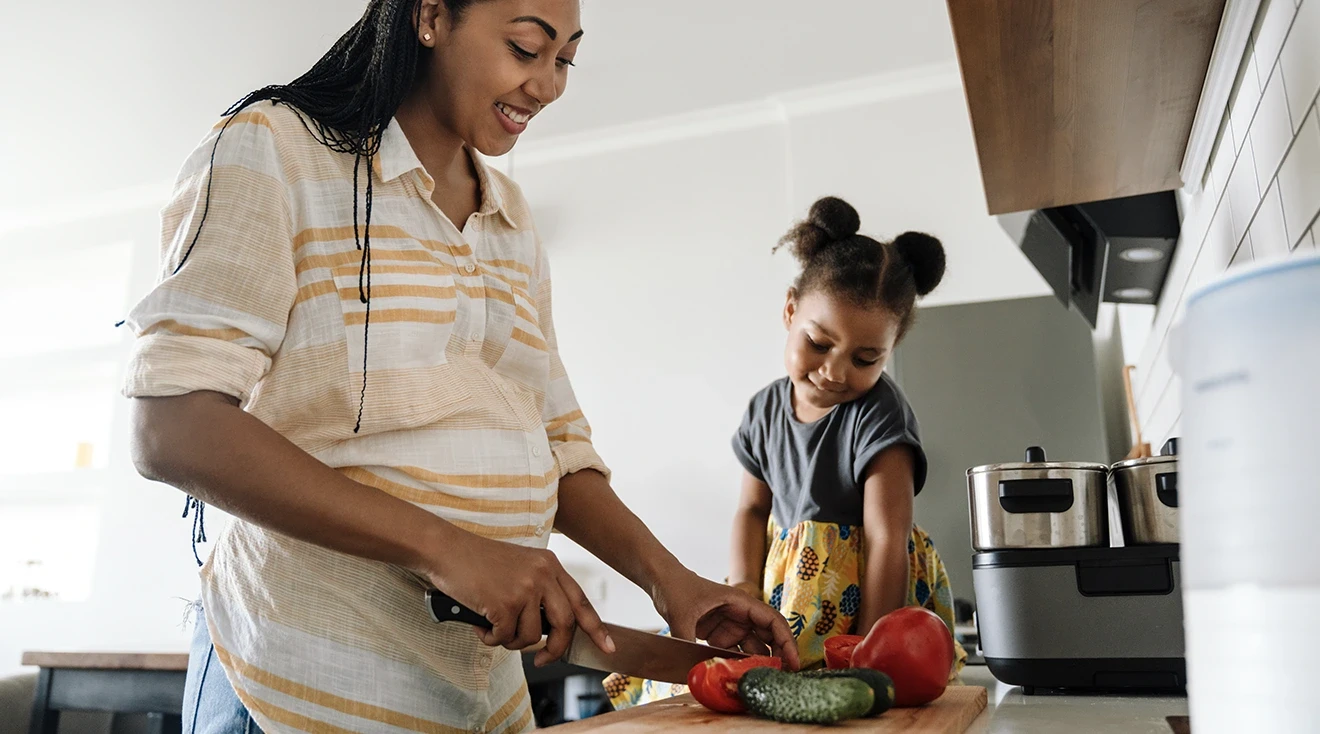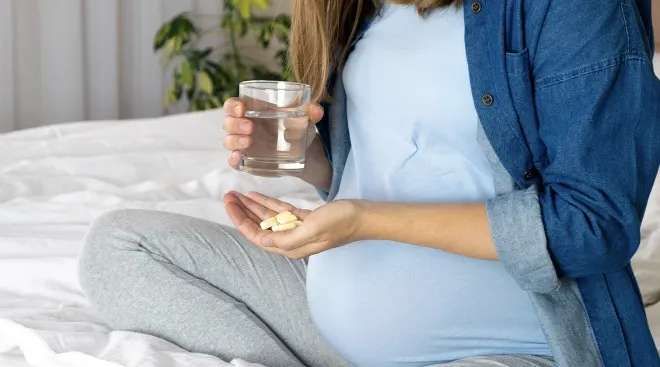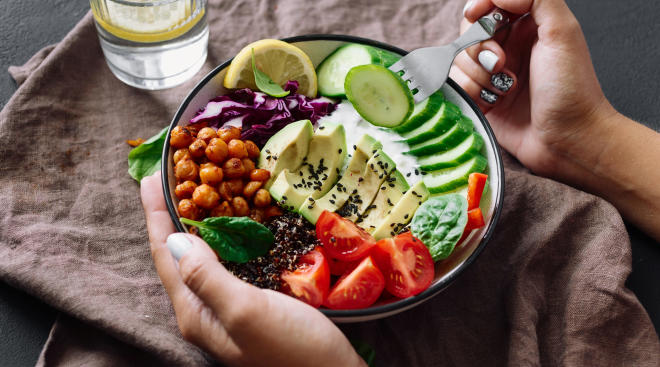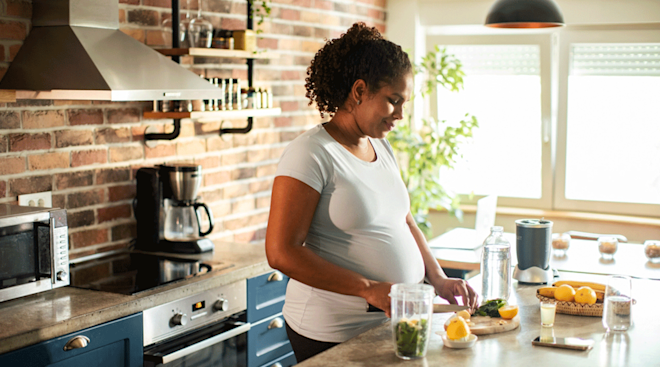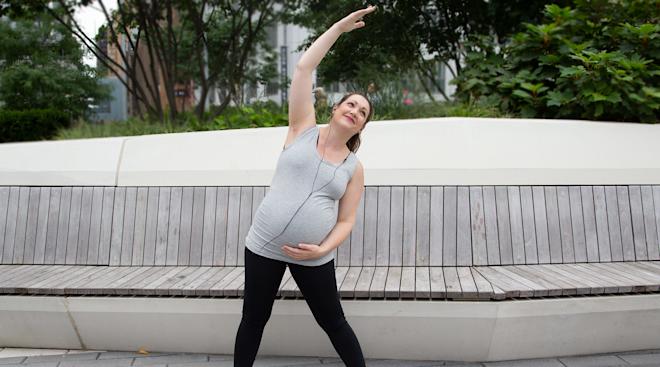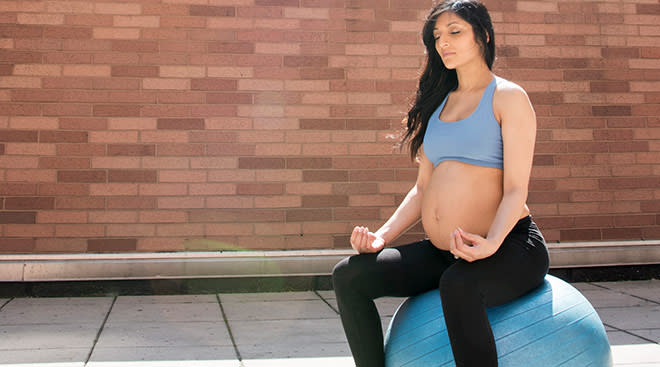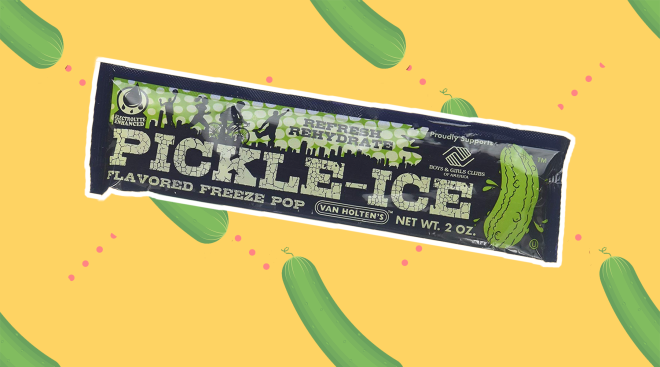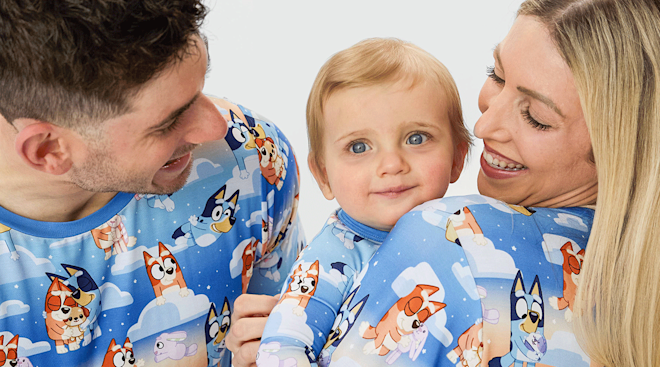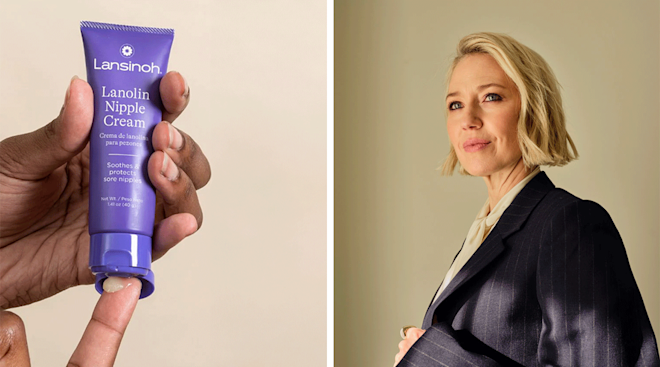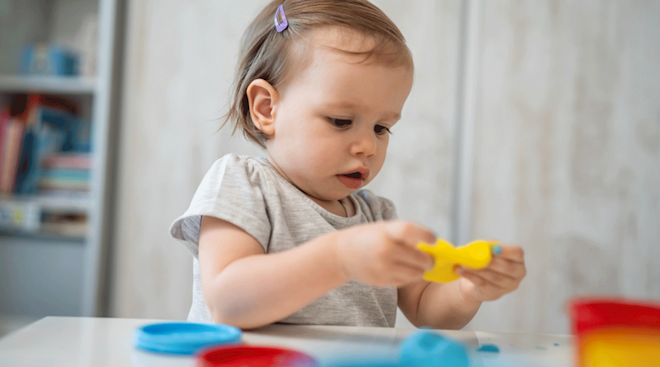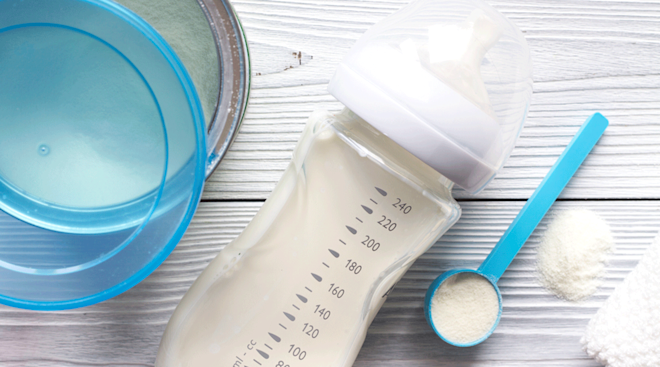How to Eat a Healthy Pregnancy Diet
Everything changes the moment that positive sign appears on your pregnancy test. But does that actually include your diet? While there are some things you’ll want to steer clear of when you’re expecting, the list of foods you should be eating may not look all that different from your pre-pregnancy grocery orders. “Dietary changes during pregnancy are very much dependent on the trimester and how you were eating prior to conceiving,” says Lyndsay Hall, RD, a registered dietitian who specializes in pre- and postnatal care at JM Nutrition in Toronto. The long and short of it: You probably won’t have to overhaul your entire diet when you find out you’ve got a baby on board, but you’ll probably want to make sure you’re getting some key vitamins and nutrients. Here, expert tips on the best foods for pregnancy to keep you and baby happy, healthy and nourished.
Believe it or not, nutritional advice that’s doled out during pregnancy isn’t that different from general dietary guidance. “We want to try and promote a diet that’s rich in fruits and vegetables, protein from animal and/or plant-based sources, complex carbohydrates, low-fat dairy products and healthy fats,” says Hall, adding that a healthy mix of these food groups will ensure you get all of the macro- and micronutrients your body needs to support a healthy pregnancy.
Of course, experts’ marching orders may not align with what you desperately feel like you need to eat once your hormones kick in (hello, pregnancy cravings!). Another unfortunate truth: While your appetite can fluctuate by the hour, the average pregnant person’s caloric needs only increase in the second and third trimesters: You need about 340 extra calories per day for one baby, 600 for two and 900 for three, notes the American College of Obstetricians and Gynecologists (ACOG). That said, this is just general guidance, and calorie needs are highly individualized. “Some may need to increase their intake in the first trimester, while others need no calorie increase until the third trimester,” says Ryann Kipping, RD, registered dietician at The Prenatal Nutritionist and author of The Feel-Good Pregnancy Cookbook.
Whatever the case, you certainly won’t need to double how many calories you consume. “You are eating for two, but the second person ranges in size and nutrient needs depending on the week of pregnancy,” explains Willow Jarosh, RD, CIEC, co-author of Healthy, Happy, Pregnancy Cookbook.
For the most part, experts agree that eating healthy during pregnancy all comes down to being more intentional about what you put on your plate. “I urge people to focus on incorporating foods high in the nutrients most important to pregnancy, regardless of calories,” says Kipping.
But a healthy pregnancy diet isn’t exclusively about getting the nutrients you need—it also involves avoiding certain foods that are considered off limits due to the risk of exposure to potential toxins and potential consequences to baby. “You’re at an increased risk for foodborne illness during pregnancy because of changes that occur to the immune system during pregnancy,” explains Jarosh. “These changes can make it tougher for a pregnant person to fight off a pathogen.”
That means deli meats, certain fish that are high in mercury, raw and undercooked meat and seafood and unpasteurized foods, plus alcohol and high amounts of caffeine are off the menu, at least for a while. But overall? “Our food supply is very safe, and you can enjoy most foods with basic food safety practices,” says Kipping.
During pregnancy, it’s important to consume ample amounts of certain vitamins that are vital for baby’s growth and development—particularly those listed below.
Important for: Preventing neural tube defects
Get at least: 600 mcg DFE of folate per day
Find it in: Whole grains, leafy greens, citrus, liver, nuts, beans, peas, seafood, eggs, dairy products, meat and poultry
Important for: Fetal neurodevelopment
Get at least: 1.4 g per day (or 8 to 12 oz.) of omega-3-rich seafood per week. (This should fulfill the recommended daily intake of 200-300mg of Omega-3 fatty acids.)
Find it in: Salmon, herring, sardines and trout, or ground flaxseed, walnuts and seaweed
Important for: Fetal bone formation, maintenance of maternal bone density and preeclampsia prevention
Get at least: 1000 mg per day
Find it in: Dairy products like yogurt, milk, cheese and kefir, plus sesame seeds, tofu, broccoli and canned salmon with bones
Important for: Fetal growth
Get at least: 15 mcg or 600 IU per day
Find it in: Fortified milk, salmon, certain yogurts and trout
Important for: Fetal brain development and maternal liver function
Get at least: 450 mg per day
Find it in: Egg yolks, beef, milk, soybeans, citrus, wheat germ and nuts
Important for: Preventing fetal neural tube defects
Get at least: 2.6 mcg per day
Find it in: Dairy products, fortified cereal, fish, red meat, poultry and eggs
Important for: Red blood cell production
Get at least: 27 mg per day
Find it in: Red meat, fish, poultry, dried fruit, dried beans and peas
Important for: Fetal eye, organ and skeletal development
Get at least: 770 mcg per day
Find it in: Dairy products, fortified cereal, salmon, organ meats, colorful vegetables, fruit and eggs
Important for: Fetal growth and reducing the risk of preterm birth
Get at least: 11 mg per day
Find it in: Cooked oysters, beef, cereal, pumpkin seeds, pork, turkey, cheese, milk and eggs
Important for: Fetal growth
Get at least: 350 to 360 mg per day
Find it in: Legumes, nuts, seeds, whole grains, leafy greens, fortified cereals and breads and dairy products
While most doctors and ob-gyns recommend taking prenatal vitamins to bridge the gap between what you eat and what your body needs during pregnancy, it’s smart to think of prenatal vitamins as back-up dancers for the headliner: a varied pregnancy diet. So what are the best foods for pregnancy? Treat your body and baby to these nutrient-dense, expert-recommended options:
Salmon
Rich in omega-3 fatty acids, salmon fills in where prenatal vitamins sometimes leave off: Omega-3 isn’t in every over-the-counter formula, notes Hall. The fatty fish is also a great source of vitamin D and a satisfying protein to keep a bottomless appetite at bay.
Dark leafy greens
A good source of folate and fiber, dark leafy greens are rich in iron and calcium, both of which are integral to a healthy pregnancy.
Colorful veggies
Chock full of fiber, colorful vegetables, such as sweet potatoes, red peppers, tomatoes and carrots, contain a multitude of vitamins like A, C, E, iron, potassium and more.
Eggs
Eggs are a solid source of protein and fat as well as folate, vitamin D, omega-3 and additional nutrients that support a healthy pregnancy.
Lean meats and poultry
Eating lean meats and poultry—think sirloin and lean ground beef or chicken and turkey breast—is an easy way to cover your pregnancy protein needs and provide plenty of dietary iron to boot.
Legumes
Full of fiber and protein, legumes, such as beans, lentils and peas, serve up necessary nutrients ranging from zinc to iron, folate and calcium. (They’re a great source of nutrients for vegans!)
Nuts
Rich in healthy fats, nuts can help you increase your calorie intake without adding lots of volume to meals and snacks—a good thing in the third trimester when energy needs peak but a growing baby makes it difficult to eat larger meals.
Avocado
Another good source of healthy plant-based fats, avocado can add calories to sandwiches and salads and deliver nutrients like folate and magnesium as well as vitamins C and E.
Whole grains
Whole grains serve up fiber to help regulate appetite and blood sugar levels. What’s more, they’re full of important pregnancy nutrients like B vitamins, iron, zinc and magnesium.
Dairy
Cheese, milk and yogurt don’t just deliver satiating fat and protein: Dairy is full of calcium, vitamin D and B vitamins.
Cooked oysters
Splurging on oysters will get you closer to meeting many of your heightened nutrient needs in pregnancy such as vitamin D, vitamin B12, vitamin A, selenium, zinc, iron, choline and folate.
Liver
Particularly rich in folate and iron, liver is a nutrient-dense food worthy of a spot on any pregnant person’s plate.
Seeds
Chia and pumpkin seeds are great additions to your pregnancy diet, thanks to their fiber, iron, zinc and magnesium content.
Eating a healthy mix of the foods above will help you get vital nutrients, but don’t go crazy trying to get it all in every day. “Meeting your needs through food alone is possible but challenging,” says Kipping, especially when you factor in food allergies, dietary restrictions and nausea, which can make eating a challenge. Despite your best efforts, seasonality can also affect nutrient intake, Jorosh notes. It’s ever the more reason to take the pressure off your plate by taking a daily prenatal vitamin.
Morning sickness, food aversions, food cravings, heartburn and feelings of fullness can make it even harder to eat a healthy pregnancy diet. Turn to these expert tips to help keep your body healthy and your tummy pleased:
- Eat what you can keep down. “Some calories are better than no calories at all,” advises Kipping. For pregnant people experiencing morning sickness, she recommends plain bran flakes with or without milk, mashed potatoes with whole milk or heavy cream and whole grain or sourdough toast with butter or nut butter.
- Choose cold foods. This can help you sidestep triggering odors, says Jorosh —a good thing for those suffering from the nausea that makes eating a challenge.
- Disguise your protein and vegetables. Turning your nose up at vegetables is common during pregnancy, notes Hall. She recommends blending them into smoothies, pureed soup and pasta sauce; mixing shredded carrot and zucchini into ground meat, baked goods and even oatmeal; mixing zucchini noodles into pasta or combining cauliflower rice with regular rice or quinoa. If protein is the thing that makes your stomach turn, make sure you get enough of it by adding natural nut butter, Greek yogurt or a pasteurized whey powder to smoothies, oatmeal and baked goods.
- Take off your chef’s hat. “For some, it’s the smell of certain foods cooking that can cause aversions,” notes Hall. Consider this your unofficial doctor’s note to step out of the kitchen while your partner does the cooking—or take it as your license to order in. (You deserve it!)
- Wait two to three hours after meals to lay down. Giving yourself time to digest can help you control heartburn, which is common during pregnancy. Avoiding trigger foods, such as citrus fruits, tomato, vinegar, spicy foods, carbonated beverages, coffee, garlic, onion and even chocolate, advises Hall.
- Choose healthier alternatives. Hall is all for healthy swaps in your pregnancy diet: Instead of ice cream, blend frozen bananas. Instead of potato chips, crunch away on kale chips. Of course, sometimes you want the real thing; feel free to opt for the food you’re craving, but be mindful of portion size.
- Pair foods you crave with a protein-rich partner. Incorporating protein like natural peanut butter into a snack you crave, like chocolate, helps satiate that hunger, says Hall.
- Eat small, frequent meals. You know what to eat when pregnant, but how can you spread the wealth of goodness throughout your day? Opt for smaller, more frequent meals. This can help you ensure adequate intake and promote healthy weight gain and development, whether you’re up against nausea in the first trimester, no-room-left-for-food in the third trimester or pesky, ever-present heartburn, says Hall. What’s more, it can provide more opportunities to eat a variety of nutrients, adds Jarosh, who recommends aiming for three meals and two to three snacks each day.
While there’s no preset menu for a healthy pregnancy diet, reaching for whole foods, including colorful veggies, fatty fish, lean proteins, whole grains, nuts and legumes, will ensure you’re getting what you and baby need. And just in case your diet doesn’t exactly deliver all the good stuff, remember to take those prenatal vitamins every day.
About the experts:
Lyndsay Hall, RD, is a registered dietitian who specializes in prenatal and postnatal care at JM Nutrition in Toronto.
Ryann Kipping, RD, is a registered dietician at The Prenatal Nutritionist and author of The Feel-Good Pregnancy Cookbook.
Willow Jarosh, RD, CIEC, is a registered dietician and co-author of Healthy, Happy, Pregnancy Cookbook.
Please note: The Bump and the materials and information it contains are not intended to, and do not constitute, medical or other health advice or diagnosis and should not be used as such. You should always consult with a qualified physician or health professional about your specific circumstances.
Plus, more from The Bump:
Lyndsay Hall, RD, is a registered dietitian who specializes in prenatal and postnatal care at JM Nutrition in Toronto.
Ryann Kipping, RD, is a registered dietician at The Prenatal Nutritionist and author of The Feel-Good Pregnancy Cookbook(https://www.amazon.com/Feel-Good-Pregnancy-Cookbook-Nutritious-Delicious/dp/1641526882?&linkCode=ll1&tag=tb-what-to-eat-when-pregnant-20&linkId=c6a9b0f6af083aebf83c71127b614ff6&language=en_US&ref=asli_ss_tl).
Willow Jarosh, RD, CIEC, is a registered dietician and co-author of Healthy, Happy, Pregnancy Cookbook(https://www.amazon.com/Healthy-Happy-Pregnancy-Cookbook-Discomforts/dp/1501130919?&linkCode=ll1&tag=tb-what-to-eat-when-pregnant-20&linkId=87e53229cb47556a89deeea48845b532&language=en_US&ref=asli_ss_tl).
American College of Obstetricians and Gynecologists, Nutrition During Pregnancy, June 2023
US Department of Health and Human Services, Folate, November 2022
US Department of Health and Human Services, Omega-3, February 2023
US Department of Health and Human Services, Calcium, October 2022
US Department of Health and Human Services, Vitamin D, September 2023
US Department of Health and Human Services, Choline, June 2022
US Department of Health and Human Services, Vitamin B12, December 2022
US Department of Health and Human Services, Iron, June 2023
US Department of Health and Human Services, Vitamin A, August 2022
US Department of Health and Human Services, Zinc, September 2022
US Department of Health and Human Services, Magnesium, March 2021
Learn how we ensure the accuracy of our content through our editorial and medical review process.
Navigate forward to interact with the calendar and select a date. Press the question mark key to get the keyboard shortcuts for changing dates.

































